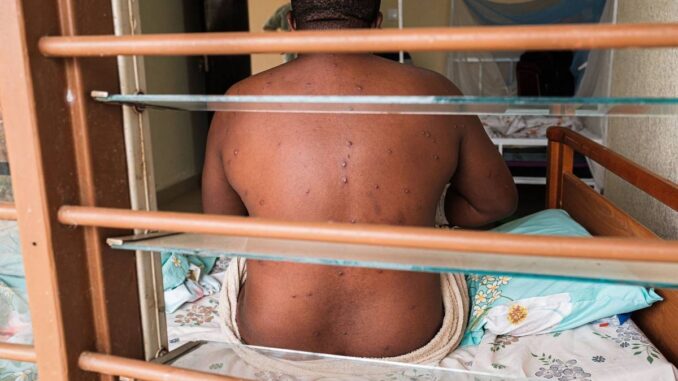
PARIS — As fears mount globally about mpox, apparently simple questions such as the danger it poses and differences between variants do not have clear and simple answers.
The World Health Organization in July declared an international health emergency over the spread of mpox, which first appeared in humans around 1970 in the Democratic Republic of Congo (DRC).
For decades, the illness long known as “monkeypox” was restricted to a handful of African countries, with estimates of its mortality rate ranging from one to 10 percent of people infected.
A man infected with Mpox shows his back inside a ward at the Kamenge University Hospital’s Mpox treatment center in Bujumbura on August 22, 2024. Burundi has confirmed 171 cases of mpox, Health Minister Polycarpe Ndayikeza said on August 22, 2024, following confirmation of the first cases in the country last month. The Democratic Republic of Congo (DRC) serves as the focal point and epicenter of the epidemic, prompting the World Health Organization (WHO) to activate its highest international alert level. Formerly known as monkeypox, mpox is an infectious disease caused by a virus transmitted to humans by infected animals that can also be passed from human to human through close physical contact. Photo by AFP
That uncertainty grew from 2022, when mpox spread elsewhere in the world, especially to Western countries.
Cases in these newly infected states had very low mortality of around 0.2 percent.
Such differences likely stem from several variables.
First, someone living in the US or Europe is much more likely to receive swift, appropriate medical treatment than patients in most African nations.
The danger mpox presents “strongly depends on the quality of basic care,” said Antoine Gessain, a virologist specializing in the disease.
The mortality rate measured in the current outbreak — around 3.6 percent — would therefore likely be much lower were it not mostly limited to the DRC.
Child malnutrition
Other factors weighing on the mortality rate include those that make some patients more vulnerable than others.
The vast majority of the deaths recorded in the DRC — over 500 out of more than 15,000 mpox cases — have been children, many of whom are affected by malnutrition in the country.
By contrast, in the DRC’s 2022-23 epidemic, the very small number of people who died — around 200 out of 100,000 cases — were mostly adults whose immune system was already weakened by HIV infection.

Individuals pass a mural showing people wearing facemasks in Barangay Ilog in Pasig on Aug. 22, 2024. Health Secretary Teodoro Herbosa warned against mpox community transmission. Herbosa said that mpox-positive individuals should isolate themselves to avoid the spread of the virus. He also said it was important to always wash hands. Additionally, the World Health Organization recommended covering wounds and wearing a medical mask when interacting with other people. PHOTO BY ISMAEL DE JUAN

Individuals pass a mural showing people wearing facemasks in Barangay Ilog in Pasig on Aug. 22, 2024. Health Secretary Teodoro Herbosa warned against mpox community transmission. Herbosa said that mpox-positive individuals should isolate themselves to avoid the spread of the virus. He also said it was important to always wash hands. Additionally, the World Health Organization recommended covering wounds and wearing a medical mask when interacting with other people. PHOTO BY ISMAEL DE JUAN

Individuals pass a mural showing people wearing facemasks in Barangay Ilog in Pasig on Aug. 22, 2024. Health Secretary Teodoro Herbosa warned against mpox community transmission. Herbosa said that mpox-positive individuals should isolate themselves to avoid the spread of the virus. He also said it was important to always wash hands. Additionally, the World Health Organization recommended covering wounds and wearing a medical mask when interacting with other people. PHOTO BY ISMAEL DE JUAN

Individuals pass a mural showing people wearing facemasks in Barangay Ilog in Pasig on Aug. 22, 2024. Health Secretary Teodoro Herbosa warned against mpox community transmission. Herbosa said that mpox-positive individuals should isolate themselves to avoid the spread of the virus. He also said it was important to always wash hands. Additionally, the World Health Organization recommended covering wounds and wearing a medical mask when interacting with other people. PHOTO BY ISMAEL DE JUAN

Individuals pass a mural showing people wearing facemasks in Barangay Ilog in Pasig on Aug. 22, 2024. Health Secretary Teodoro Herbosa warned against mpox community transmission. Herbosa said that mpox-positive individuals should isolate themselves to avoid the spread of the virus. He also said it was important to always wash hands. Additionally, the World Health Organization recommended covering wounds and wearing a medical mask when interacting with other people. PHOTO BY ISMAEL DE JUAN
Different mortality outcomes can also be explained by the way a disease is spread.
In 2022-23, most transmission was via sex between homosexual or bisexual men.
A further factor adding complexity is the clade, or family, to which the specific virus causing an mpox outbreak belongs.
Scientists are struggling to determine the differences between clades when it comes to health risks and transmission.
Tricky comparisons
The 2022-23 mpox epidemic was caused by Clade 2 mpox, which is mostly present in western Africa, but also found in South Africa.
DRC’s deadly current outbreak stems from Clade 1 mpox, mostly found in the continent’s central areas.
But a distinct second epidemic hitting mostly adults in the same country is linked to variant 1b, a derivative of Clade 1 that has only appeared recently.
Confusion in the media has led some outlets to call variant 1b more dangerous than previously-existing mpox varieties.
“There are rather big claims in the popular media for which evidence is limited, both about severity and about transmissibility of the new sublineage 1b,” Dutch virologist Marion Koopmans told the UK-based Science Media Center.
“What we do know is that Clade 1 is associated with more severe disease than Clade 2,” she added.





Be the first to comment